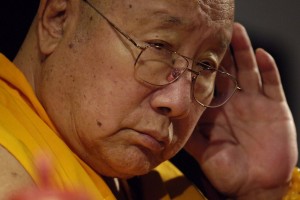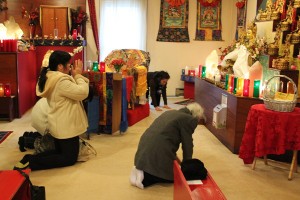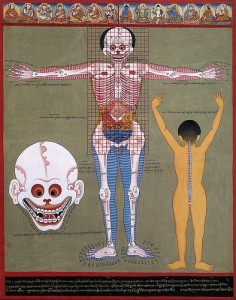The following is an excerpt from a teaching by Kyabje His Holiness Penor Rinpoche offered at Palyul Ling Retreat:
When I was in Tibet I studied all this Dharma with my teacher, Khenpo Nuden. He was a great Dzogchen master. We received the transmission on the four volume text called Duba Do, which he has composed. There were five of us receiving this Dharma. We all tried to maintain the disciplines of being very humble and respectful, and not disturbing the lama’s mind.
We also had another Khenpo with us. This Khenpo always had coughing fits. He was always coughing. To announce the start of class each morning, a gong would ring. But one morning nobody rang the gong. We went to the lama’s place anyway, and asked, “Why was there no gong?” The lama was really angry and told us that there was no need to ring the gong. I went to him, and said, “It is time now. May I ring the gong?” He said, “No.” Then I asked, “Are you sick or something?” And he said, “No, I’m not sick.” Then I asked, “Did you have a disturbing dream?” He said, “No.” After asking a few questions, he said, “You guys are not really respecting me.” Then I said, “We all do respect you. We are just trying to maintain good discipline.” Then the lama said, “Well, you know Khenpo clears his throat a lot, coughing up stuff.” What to do? He had an illness. It was natural, but we told him not to be too loud. We made a commitment to maintain discipline, and then later the lama started the teaching. No one dared to cough loudly in front of the lama. Talking to each other or making noise or getting up and down in front of the lama never happened when we visited the lama. One should be careful when visiting the lama. There is a whole book that gives lessons on how to relate with the master.
Disturbing the lama’s mind a little bit obscures one’s path and bhumis. Once one actualizes these stages of realization and the path, then one can do whatever one wants to do. Until achieving the ultimate fruition, the Buddhahood, enlightenment, until then we must relate to and rely on a master. One should respect and follow, and through that one can receive the blessing. Then there is benefit. Even with millions of dollars, there is no way to buy the Dharma teaching through which one can attain complete enlightenment. Because if there is even a tiny breakage of samaya, then it obscures one’s own power or realization. The life force of the Dharma is the words of honor, the samaya. Even though you guys are very good, it is still good to understand how these things should be done.




